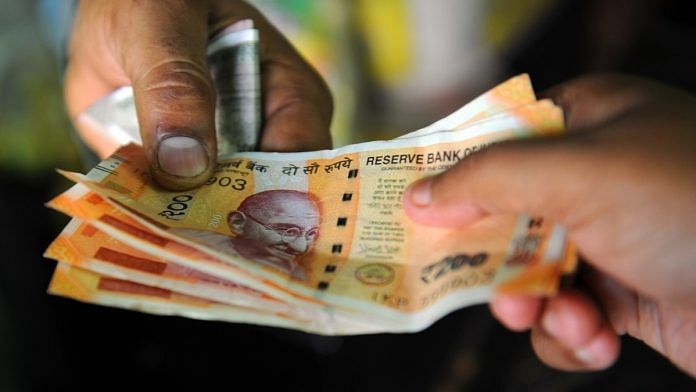New Delhi: Electoral bonds worth Rs 1,213 crore were sold and encashed from January to March 2022, the Ministry of Finance said in response to a question raised in the Lok Sabha Monday.
In 2018, bonds worth Rs 1,000 crore were sold, while in 2019 during the Lok Sabha elections, the total rose to over Rs 5,000 crore. In 2020, bonds worth Rs 363 crore were encashed, while in 2021, more than Rs 1,500 crore was sold and encashed, the finance ministry revealed in its answer.
The number of electoral bonds — a tool to make anonymous donations to political parties — sold and encashed this year is significant because of the five state assembly elections held in February and March. Bonds worth a total of Rs 9,187 crore have been sold and encashed since the scheme’s inception in 2018.
The question by Congress MPs Jasbir Singh Gill, Abdul Khaleque and Balubhau Dhanorkar, and the Telangana Rashtra Samithi’s Kotha Prabhakar Reddy, also sought the details of the bonds sold and encashed party-wise, and the number of electoral bonds issued to foreign entities since the scheme’s inception.
The ministry responded that the details of political party-wise encashment of electoral bonds are not collated centrally at the State Bank of India (SBI). It also said that no electoral bonds are issued to foreign identities
According to the finance ministry, more than 95 per cent of the individual bonds were worth Rs 1 crore each, the highest denomination available under the scheme. Most of these were issued at SBI’s Mumbai main branch.
Debate on electoral bonds
The electoral bond is a financial tool for making donations to political parties, first brought in during the Union Budget in 2017-2018. The bonds are ‘bearer’ in nature, which means that they do not carry the name of the buyer or payee, and no ownership information is recorded.
The electoral bonds scheme allows citizens of India and domestic companies to donate these bonds — available in the denominations of Rs 1,000, Rs 10,000, Rs 1 lakh, Rs 10 lakh, and Rs 1 crore — to political parties of their choice, which must then redeem them within 15 days.
According to a report by the Delhi-based rights group Association for Democratic Reforms, in the financial year 2018-19, the Bharatiya Janata Party (BJP) received Rs 1,450.89 crore in electoral bonds, while the Congress got Rs 383.26 crore.
In 2019-20, electoral bonds worth Rs. 3,429.56 crore were redeemed, and 87.29 per cent of this was received by four national parties: the BJP, the Congress, the Trinamool Congress (TMC), and the Nationalist Congress Party (NCP).
The scheme has attracted many critics, from transparency activists to official bodies. In 2017, the Election Commission of India (ECI) had objected to the amendments in the Representation of the People Act that exempted political parties from disclosing donations received through electoral bonds.
Last year, the Supreme Court had dismissed a plea seeking a stay on the further sale of electoral bonds ahead of assembly elections in four states.
Speaking to ThePrint, RTI activist Anjali Bhardwaj said that anonymity regarding political donations is concerning, and a violation of the Right to Information.
“This is concerning because electoral bonds are totally anonymous funding, and there is no way to find out who the donors are and which political parties they are donating to. So it is really a violation of people’s Right to Information to know who is funding the political party that they are going to vote for,” said Bhardwaj.
“The policies and laws formulated by the parties would naturally serve the interests of the funders.This could potentially be leading to huge amounts of black money laundering, which the RBI commissioner and the Election Commission had also warned about,” she added.
(Edited by Rohan Manoj)
Also read: Cash-mukt Congress soon? Data shows leadership crisis is not party’s only problem since 2014



